6 books about Mendes-Flohr, Paul
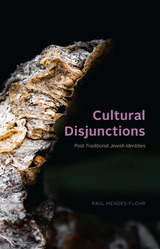
Cultural Disjunctions
Post-Traditional Jewish Identities
Paul Mendes-Flohr
University of Chicago Press, 2021
The identity of contemporary Jews is multifaceted, no longer necessarily defined by an observance of the Torah and God’s commandments. Indeed, the Jews of modernity are no longer exclusively Jewish. They are affiliated with a host of complementary and sometimes clashing communities—vocational, professional, political, and cultural—whose interests may not coincide with that of the community of their birth and inherited culture. In Cultural Disjunctions, Paul Mendes-Flohr explores the possibility of a spiritually and intellectually engaged cosmopolitan Jewish identity for our time. Reflecting on the need to participate in the spiritual life of Judaism so that it enables multiple relations beyond its borders and allows one to balance Jewish commitment with a genuine obligation to the universal, Mendes-Flohr lays out what this delicate balance can look like for contemporary Jews, both in Israel and in diasporic communities worldwide. Cultural Disjunctions walks us through the labyrinth of twentieth-century Jewish cultural identities and commitments. Ultimately, Mendes-Flohr calls for Jews to remain “discontent,” not just with themselves but also and especially with the reigning social and political order, and to fight for its betterment.
[more]
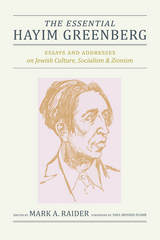
The Essential Hayim Greenberg
Essays and Addresses on Jewish Culture, Socialism, and Zionism
Hayim Greenberg, Edited and introduced by Mark Raider, Foreword by Paul Mendes-Flohr
University of Alabama Press, 2016
Though well known to many scholars and critics in the field of Judaic studies, Hayim Greenberg remains relatively unknown. Since his death in 1953, Greenberg’s contributions to modern Jewish thought have largely fallen from view. In The Essential Hayim Greenberg: Essays and Addresses on Jewish Culture, Socialism, and Zionism, the first collection of Greenberg’s writings since 1968, Mark A. Raider reestablishes Greenberg as a prominent Jewish thinker and Zionist activist who challenged the prevailing orthodoxies of American Jewry and the Zionist movement.
This collection of thoroughly annotated essays, spanning the 1920s to the early 1950s, includes Greenberg’s meditations on socialism and ethics, profiles of polarizing twentieth-century figures (among them Trotsky, Lenin, and Gandhi), and several essays investigating the compatibility of socialism and communism. Greenberg always circles back, however, to the recurring question of how Jews might situate themselves in modernity, both before and after the Holocaust, and how Labor Zionist ideology might reshape the imbalances of Jewish economic life.
Alongside his role as an American Zionist leader, Greenberg maintained a lifelong commitment to the vitality of the Jewish diaspora. Rather than promoting Jewish autonomy and statehood, he argued for fidelity to the Jewish spirit. This volume not only seeks to restore Greenberg to his previous stature in the field of Judaic studies but also to return a vital and authentic voice, long quieted, to the continuing debate over what it means to be Jewish.
The Essential Hayim Greenberg provides an accessible text for scholars, historians, and students of Jewish studies, religion, and theology.
This collection of thoroughly annotated essays, spanning the 1920s to the early 1950s, includes Greenberg’s meditations on socialism and ethics, profiles of polarizing twentieth-century figures (among them Trotsky, Lenin, and Gandhi), and several essays investigating the compatibility of socialism and communism. Greenberg always circles back, however, to the recurring question of how Jews might situate themselves in modernity, both before and after the Holocaust, and how Labor Zionist ideology might reshape the imbalances of Jewish economic life.
Alongside his role as an American Zionist leader, Greenberg maintained a lifelong commitment to the vitality of the Jewish diaspora. Rather than promoting Jewish autonomy and statehood, he argued for fidelity to the Jewish spirit. This volume not only seeks to restore Greenberg to his previous stature in the field of Judaic studies but also to return a vital and authentic voice, long quieted, to the continuing debate over what it means to be Jewish.
The Essential Hayim Greenberg provides an accessible text for scholars, historians, and students of Jewish studies, religion, and theology.
[more]
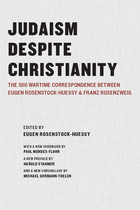
Judaism Despite Christianity
The 1916 Wartime Correspondence Between Eugen Rosenstock-Huessy and Franz Rosenzweig
Edited by Eugen Rosenstock-Huessy
University of Chicago Press, 2011
Before they were both internationally renowned philosophers, Eugen Rosenstock-Huessy and Franz Rosenzweig were young German soldiers fighting in World War I corresponding by letter and forming the foundation of their deep intellectual friendship. Collected here, this correspondence provides an intimate portrait of their views on history, philosophy, rhetoric, and religion as well as on their writings and professors. Most centrally, Rosenstock-Huessy and Rosenzweig discuss, frankly but respectfully, the differences between Judaism and Chiristianity and the reasons they have chosen their respective faiths.
This edition includes a new foreword by Paul Mendes-Flohr, a new preface by Harold Stahmer along with his original introduction, and essays by Dorothy Emmet and Alexander Altmann, who calls this correspondence “one of the most important religious documents of our age” and “the most perfect example of a human approach to the Jewish-Christian problem.”
[more]
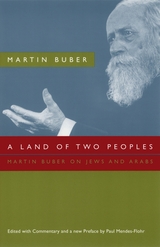
A Land of Two Peoples
Martin Buber on Jews and Arabs
Martin Buber
University of Chicago Press, 2005
Theologian, philosopher, and political radical, Martin Buber (1878–1965) was actively committed to a fundamental economic and political reconstruction of society as well as the pursuit of international peace. In his voluminous writings on Arab-Jewish relations in Palestine, Buber united his religious and philosophical teachings with his politics, which he felt were essential to a life of public dialogue and service to God.
Collected in ALand of Two Peoples are the private and open letters, addresses, and essays in which Buber advocated binationalism as a solution to the conflict in the Middle East. A committed Zionist, Buber steadfastly articulated the moral necessity for reconciliation and accommodation between the Arabs and Jews. From the Balfour Declaration of November 1917 to his death in 1965, he campaigned passionately for a "one state solution.
With the Middle East embroiled in religious and ethnic chaos, A Land of Two Peoples remains as relevant today as it was when it was first published more than twenty years ago. This timely reprint, which includes a new preface by Paul Mendes-Flohr, offers context and depth to current affairs and will be welcomed by those interested in Middle Eastern studies and political theory.
Collected in ALand of Two Peoples are the private and open letters, addresses, and essays in which Buber advocated binationalism as a solution to the conflict in the Middle East. A committed Zionist, Buber steadfastly articulated the moral necessity for reconciliation and accommodation between the Arabs and Jews. From the Balfour Declaration of November 1917 to his death in 1965, he campaigned passionately for a "one state solution.
With the Middle East embroiled in religious and ethnic chaos, A Land of Two Peoples remains as relevant today as it was when it was first published more than twenty years ago. This timely reprint, which includes a new preface by Paul Mendes-Flohr, offers context and depth to current affairs and will be welcomed by those interested in Middle Eastern studies and political theory.
[more]
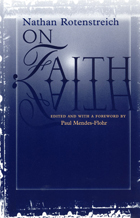
On Faith
Nathan Rotenstreich
University of Chicago Press, 1998
The concept of faith has remained inscrutable to thinkers for centuries. The late Nathan Rotenstreich believed that faith was such a difficult topic for so many because of its inextricable links to theology and religion. On Faith, Rotenstreich's last work which was edited and prepared for publication by Paul Mendes-Flohr, attempts to detach the concept from its religious underpinnings and consider it in its own right, as a human phenomenon and cognitive attitude. Faith, Rotenstreich contends, should not be confused with its historical manifestations. By making faith a philosophical rather than a theological matter, he explores its essence as an awareness of how we relate within mundane reality to all that is beyond the human world. Arguing for the intentionality of faith, Rotenstreich shows how it structures a variety of relations that range from the experience of the holy to the nature of cults, traditional religion, and the idea of servitude to God.
Rotenstreich's phenomenological study will be of great importance for religious scholars as well as for philosophers.
Nathan Rotenstreich (1913-93) was professor of philosophy at the Hebrew University of Jerusalem. He was elected to the Israel Academy of Sciences and Humanities, and his works include Jews and German Philosophy and Reason and Its Manifestations: A Study of Kant and Hegel.
Rotenstreich's phenomenological study will be of great importance for religious scholars as well as for philosophers.
Nathan Rotenstreich (1913-93) was professor of philosophy at the Hebrew University of Jerusalem. He was elected to the Israel Academy of Sciences and Humanities, and his works include Jews and German Philosophy and Reason and Its Manifestations: A Study of Kant and Hegel.
[more]

The Philosophy of Franz Rosenzweig
Edited by Paul Mendes-Flohr
University Press of New England, 2002
Eleven essays on the life and thought of the Jewish philosopher and theologian Franz Rosenzweig.
[more]
READERS
Browse our collection.
PUBLISHERS
See BiblioVault's publisher services.
STUDENT SERVICES
Files for college accessibility offices.
UChicago Accessibility Resources
home | accessibility | search | about | contact us
BiblioVault ® 2001 - 2024
The University of Chicago Press









